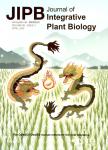Basic-leucine zipper 17 and Hmg-CoA reductase degradation 3A are involved in salt acclimation memory in Arabidopsis
Basic-leucine zipper 17 and Hmg-CoA reductase degradation 3A are involved in salt acclimation memory in Arabidopsis作者机构:College of Biological Sciences China Agricultural University
出 版 物:《Journal of Integrative Plant Biology》 (植物学报(英文版))
年 卷 期:2019年第61卷第10期
页 面:1062-1084页
核心收录:
学科分类:0710[理学-生物学] 07[理学] 09[农学] 0901[农学-作物学] 0703[理学-化学] 0902[农学-园艺学]
基 金:supported by the National Natural Science Foundation of China (31771489 and 31571384)
主 题:Basic-leucine zipper 17 Hmg-CoA reductase
摘 要:Salt acclimation, which is induced by previous salt exposure, increases the resistance of plants to future exposure to salt stress. However, little is known about the underlying mechanism, particularly how plants store thememory of salt exposure. In this study, we established a system to study salt acclimation in Arabidopsis thaliana. Following treatment with a low concentration of salt, seedlings were allowed to recover to allow transitory salt responses to subside while maintaining the sustainable effects of salt acclimation. We performed transcriptome profiling analysis of these seedlings to identify genes related to salt acclimation memory. Notably, the expres-sion of Basic-leucine zipper 17 (bZIP17) and Hmg-CoA reductase degradation 3A (HRD3A), which are important in the unfolded protein response (UPR) and endoplasmic reticulum-associated degradation (ERAD), respectively, increased following treatment with a low concentration of salt and remained at stably high levels after the stimulus was removed, a treatment which improved plant tolerance to future high-salinity challenge. Our findings suggest that the upregulated expression of important genes involved in the UPR and ERAD represents a memory of the history of salt exposure and enables more potent responses to future exposure to salt stress, providing new insights into the mechanisms underlying salt acclimation in plants.



